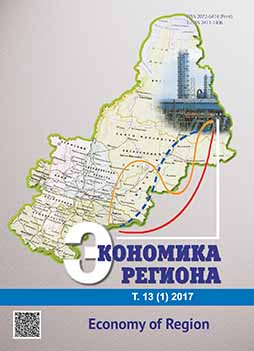Государственно-частное партнерство — основная форма реализации транспортно-транзитного потенциала России
Public-Private Partnership as the Core Form of the Implementation of Russia’s Transport and Transit Potential
Author(s): Valery Anatolevich Tsvetkov, Kobilzhon Khodzhievich Zoidov, Alexey Anatolyevich MedkovSubject(s): Economy
Published by: Институт экономики Уральского отделения Российской академии наук
Keywords: transport and transit potential; investment projects; public-private partnerships; international transport corridors; Euro-Asian routes; railway transport; shipping;
Summary/Abstract: The article discusses the theory and practice of the implementation and development of transport and transit potential (TTP) of Russia. This could be an effective way to replace the natural resource rent as the main source of income for the state and economic actors. For the modernization of national economic system the key importance are innovative technologies in the development of transport and transit potential through the organization of the production of goods and services with the highest added value in Russia. We proposed and substantiated the hypothesis about the necessity of creation of a Federal company responsible for the financing and implementation of Russia’s transport and transit potential development projects on the principles of public-private partnership (PPP). The authors have revealed the economic, institutional and organizational prerequisites for the establishment of such a public-private partnership company. We have provided the opinions of scientists and experts showing the urgent need to create in one form or another a single operator to transport goods on the territory of Russia and the Eurasian economic Union. To prove the hypothesis, we presented a description and analysis of the factors affecting the value of transit freight transport on Euro-Asian routes. We paid the special attention to identify the reasons of the increasing competitive advantage of Maritime transport in the world’s goods movement system. The authors based the main conclusion that, first of all, the created publicprivate partnership company should be large due to tough competition of developing transit freight by land routes with the global Maritime container services. Secondly, it needs a significant state participation since the management of the world’s cargo flows requires the effort of foreign policy and geo-economic nature. We emphasized that this business entity would become an active proponent and lobbyist of the most effective projects for the development of transport infrastructure of the country. The research is based on the methods of system analysis, theory of structural and technological balance of economics, organization theory, evolution and institutional theory and utilizes historical approach. The results of the study can be used for the development of the state economic sectoral programmes of structural reforms; indicative plans of innovative development of rail, sea, road infrastructure and transport machine building; as well as for the preparation and implementation of specific projects of financing the development of transport and transit potential on a public-private partnership basis.
Journal: Экономика региона
- Issue Year: 13/2017
- Issue No: 1
- Page Range: 1-12
- Page Count: 12
- Language: Russian

